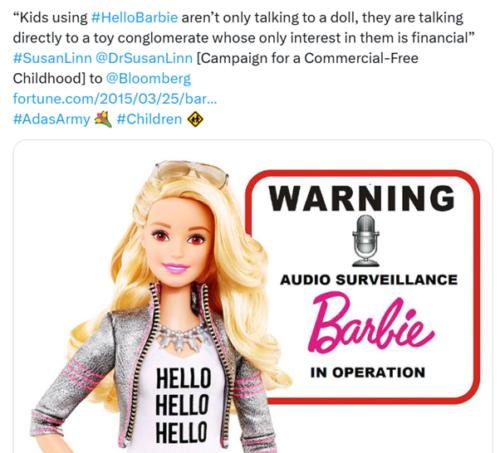Mattel's monopoly in the toy industry, particularly its dominance in the doll market with the iconic Barbie brand, has raised concerns about its impact on competition, consumer choice, and the broader toy industry. Let's delve into the intricacies of Mattel's influence, the rise of AI-powered dolls, and the growing appeal of artisan alternatives.
The Rise and Reign of Barbie
Introduced in 1959, Barbie revolutionized the doll industry. Her aspirational lifestyle, diverse career paths, and ever-evolving fashion sense resonated with generations of children. This cultural phenomenon propelled Mattel to a leading position, shaping the way young girls envisioned their futures.
However, Barbie’s influence has not been entirely positive. Apart from the fact that Barbie has links to Hitler! Information courtesy of our friend, ACE of Spades. Critics argue that her unrealistic body proportions and narrow beauty standards perpetuate harmful stereotypes and unrealistic expectations, particularly for young girls. The homogenization of beauty ideals, driven by mass-produced dolls like Barbie, can limit children's imagination and creativity.
Mattel’s Strategic Moves: Acquisitions and Extensions
Mattel's dominance has been further strengthened through strategic acquisitions and brand extensions. The acquisition of American Girl in 1998 expanded its reach to a younger demographic, while the introduction of brands like Hot Wheels and Fisher-Price diversified its product portfolio.
More recently, Mattel has ventured into the realm of artificial intelligence with its AI-powered Barbie doll, 'Hello Barbie'. While this innovation promises interactive play experiences, it also raises concerns about privacy, data security, and the potential for excessive screen time. As AI technology advances, it is crucial to consider the ethical implications and potential negative impacts on children's development.

The Impact on Competition and Consumer Choice
Mattel's market dominance has limited the availability of diverse and affordable doll options. Smaller competitors may struggle to gain traction in a market dominated by a powerful player like Mattel. This lack of competition can stifle innovation, reduce consumer choice, and ultimately harm the overall quality of products available to children.
The Allure of Artisan Dolls: A Creative Alternative
Mattel's monopoly in the toy industry, particularly its dominance in the doll market with the iconic Barbie brand, has raised concerns about its impact on competition, consumer choice, and the broader toy industry. Let's delve into the intricacies of Mattel's influence, the rise of AI-powered dolls, and the growing appeal of artisan alternatives.
Mattel's dominance has been further strengthened through strategic acquisitions and brand extensions. The acquisition of American Girl in 1998 expanded its reach to a younger demographic, while the introduction of brands like Hot Wheels and Fisher-Price diversified its product portfolio.
In recent years, there has been a growing interest in artisan dolls. These handcrafted creations offer a unique and personalized experience, often featuring intricate details, diverse body types, and realistic facial expressions. Artisan dolls can spark children's imaginations, encourage creativity, and promote a more inclusive and body-positive view of beauty.
The Power of Representation: Challenging Mattel's Monopoly
The limitations of mass-produced dolls extend beyond aesthetics. Artists like Sheila Pree Bright, in her powerful series "Plastic Bodies," have used dolls to challenge the racist and sexist stereotypes perpetuated by these toys. By combining images of real women with doll faces, Pree Bright forces viewers to confront the unrealistic beauty standards imposed on women, particularly women of color. This was explored by Sheila Pree Bright in her Plastic Bodies exhibition. Additionally, the exhibition "Dolls in Contemporary Art: More Than Child's Play" highlights how artists are using dolls to explore complex themes of identity, gender, and social norms. By showcasing the power of dolls in contemporary art, these exhibits demonstrate the potential for dolls to be more than just playthings, but instruments for social commentary and creative expression.
This link between artistry and representation is precisely what fuels the rise of artisan dolls. These handcrafted creations offer a platform for diverse narratives, celebrating different cultures, body types, and abilities. In contrast to the homogenized world of mass-produced dolls, artisan dolls empower children to see themselves and others reflected in the toys they play with, fostering a more inclusive and accepting world.
Why Choose Artisan Dolls?
- Unique and Personalized: Each artisan doll is a one-of-a-kind creation, reflecting the artist's unique style and vision.
- Ethical and Sustainable: Many artisan doll makers prioritize sustainable materials and ethical production practices.
- Educational and Inspiring: These dolls can spark children's imaginations and encourage them to explore different cultures and historical periods.
- Supporting Small Businesses: By purchasing artisan dolls, you support small businesses and contribute to local economies.
A Call to Action: Reclaiming the Magic of Doll Play
By embracing the beauty and diversity of artisan dolls, we can empower children to dream big, think creatively, and appreciate the value of individuality. Let's break free from the confines of mass-produced, homogenized toys and embrace the artistry and soul of handcrafted dolls.
By supporting artisan doll makers, we can help to foster a more diverse and inclusive toy industry, one that values creativity, sustainability, and the unique potential of every child. Let's reclaim the magic of doll play and inspire the next generation of dreamers and doers.
